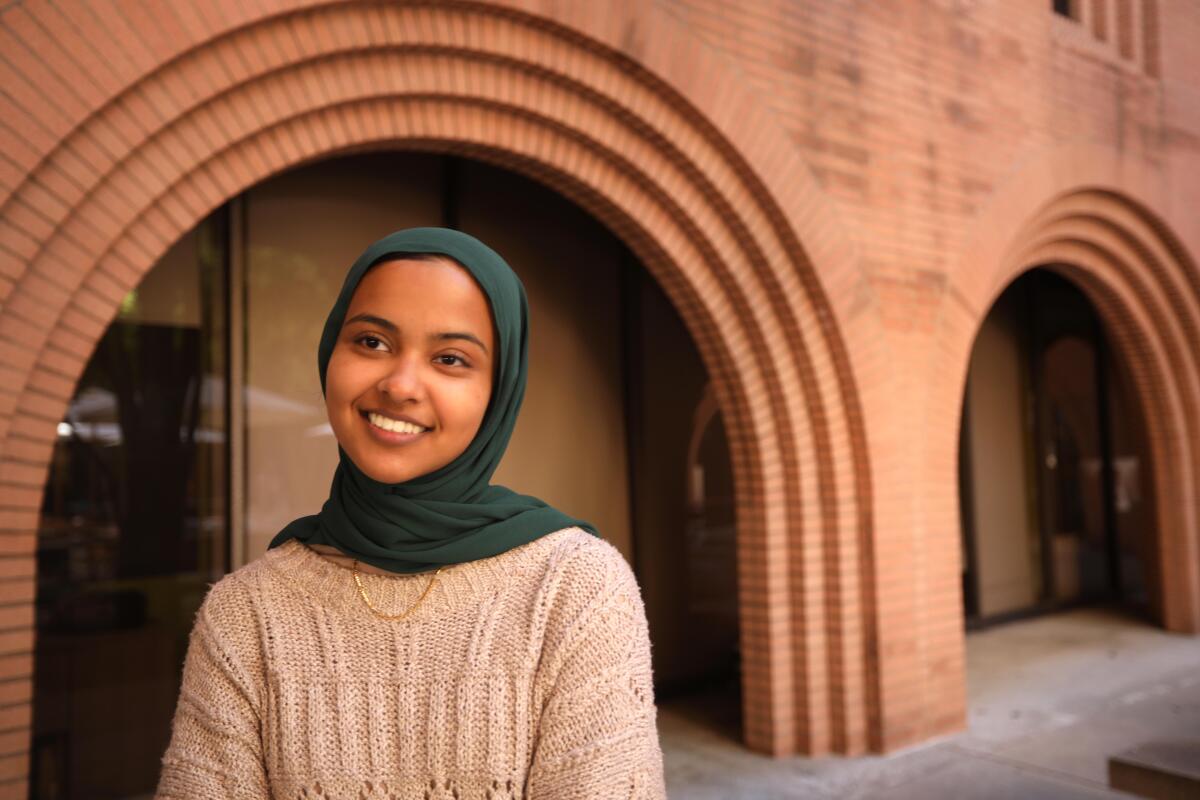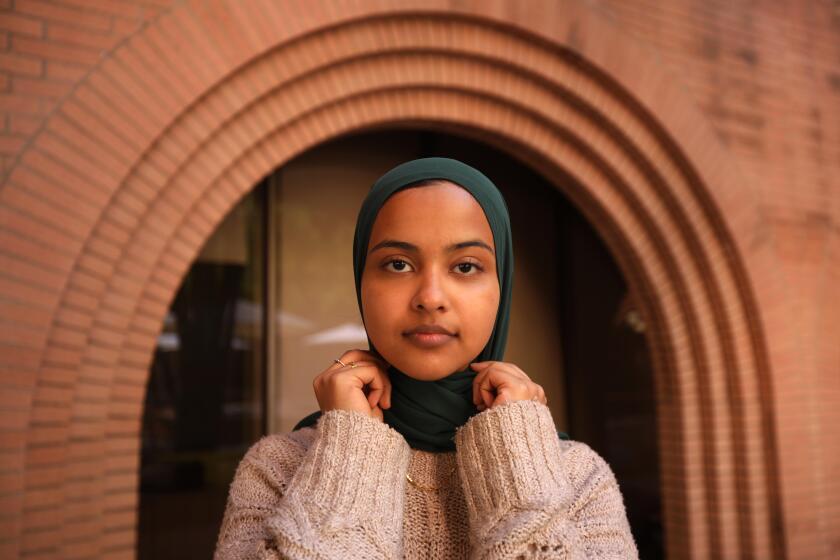USC valedictorian’s grad speech is canceled: ‘The university has betrayed me’

When Asna Tabassum learned that USC had disinvited her from speaking at next month’s graduation, she hadn’t yet planned what she would say in her remarks, beyond that she would convey a message of hope.
University leaders who announced the decision Monday, after pro-Israel groups criticized a link on Tabassum’s Instagram page as evidence of her being antisemitic, didn’t know the theme of her speech because she hadn’t shared it with them, the class valedictorian said an interview with The Times on Tuesday.
Tabassum, a biomedical engineering major, said that in addition to hope, she was thinking of touching on “how we must continue to use our education as a privilege to inform ourselves and ultimately make a change in the world.”
In keeping Tabassum from giving a three- to five-minute speech in front of 65,000 people during the May 10 ceremony, USC Provost Andrew T. Guzman cited the need to “maintain campus safety and security.” The university alluded to unnamed threats but has not publicly detailed them.
The move was unprecedented for a ceremony where students regularly make political and cultural statements through written message on their graduation caps and sashes, as well as through the traditional valedictory speech.
USC cites safety reasons in canceling the upcoming graduation speech of pro-Palestinian valedictorian from speaking onstage at her ceremony.
The backlash against Tabassum, who was chosen as valedictorian by a university committee from nearly 100 applicants with GPAs of 3.98 or above, was unusual, even at a time of intense campus strife between pro-Palestinian and pro-Israel activists, because it didn’t involve anything she said or did. The opposition appeared to stem mostly from a link on her Instagram profile to a website she did not create.
The site, Free Palestine Carrd, features a photo of a woman raising a Palestinian flag above plumes of smoke during a 2018 protest near the Israel-Gaza border. A series of links explains how to “learn about what’s happening in Palestine.”
The links include statements that Zionism is a “racist settler-colonialist ideology” and that founders of Zionism thought “Palestinians needed to be ethnically cleansed from their homes.” The website explains proposals for two-state and one-state solutions to the Israeli-Palestinian conflict.
“One Palestinian state would mean Palestinian liberation, and the complete abolishment of the state of Israel,” it says, adding that “both Arabs and Jews can live together.”
Speaking to The Times on Tuesday, Tabassum defended herself, saying she is not antisemitic. She said she supports the pro-Palestinian cause that has grown at college campuses since the Oct. 7 Hamas-led attack on Israel, which killed 1,200 people and took about 240 hostage before Israel’s retaliatory war in the Gaza Strip. Gaza health authorities say the war has killed nearly 34,000 Palestinians. According to the United Nations, 2 million Gazans are in near-famine conditions.
“The university has betrayed me and caved in to a campaign of hatred,” Tabassum said of online attacks demanding that the university rescind its invitation for her to speak at the graduation.
She said that the university did not share any details with her about its security concerns and that it did not offer her an alternative method of participating in the commencement, such as a video appearance.
In an interview Monday, Guzman said that he did not consult Tabassum before rescinding the invitation and that he saw the decision as solely a safety — not free speech — issue.
On Tuesday, Joel Curran, USC’s senior vice president of communications, said the “final decision” on the matter rested with university President Carol Folt.
Folt was not available for an interview.
“Whenever there is a question of safety and security of the campus, the president always makes the final decision,” Curran said. “This decision was made in the best interests of campus security. There has been no change from the provost’s letter on Monday.”
Tabassum, who said she has participated in pro-Palestinian activism at USC but “not taken a public role,” said the controversy has made her more strident in her views on the Israel-Hamas war and student activism.
“It’s no longer about free speech. It’s no longer about me. It is about when the university silences me, they are silencing all these people,” she said, referring to pro-Palestinian activists at USC and outside the campus.
“When you silence us, you make us louder. You make louder the aims of imparting hope and commitment to human rights and the responsibilities of graduates to use our education ... to make the world a better place,” said Tabassum, 21.
A hijab-wearing Muslim who grew up in San Bernardino County in an Indian American family, Tabassum said she feels singled out by critics for her race and faith.
“I’m not ignorant of who I am or what I believe in and the time we are in or the place we are in,” she said. “I am not ignorant of the context or environment, at the end of the day.”
Tabassum, who minored in resistance to genocide, suggested her opponents were mistaken about her views and her studies.
The program, an official minor at USC, requires students to enroll in five courses from a list that includes several on the Holocaust as well as on the Armenian genocide and other genocides, such as targeted killings of Tutsis in Rwanda in 1994.
Tabassum said she “studied the Holocaust extensively in multiple classes” but “did not take a class exclusively on the Holocaust.”
She tied the minor to her major in biomedical engineering.
“I see my work as using health technologies that could preserve access to health for all people who have been subjugated to evil. That includes, at its most extreme, genocide,” Tabassum said.
She said she is interested in going to graduate school but, for now, is focused on her final exams the first week of May.
Tabassum, who wrote a statement about the matter, declined to say whether she will attend the graduation ceremony.
More to Read
Sign up for Essential California
The most important California stories and recommendations in your inbox every morning.
You may occasionally receive promotional content from the Los Angeles Times.












